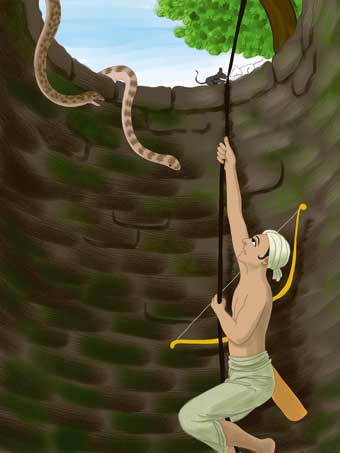
One day, the Buddha shared a story with his disciples, with the hope that they could often contemplate on its meaning.
A long time ago, there lived a hunter. While one day walking in the great open grasslands, this hunter suddenly became the object of an elephant’s frantic charge. The panic stricken hunter, running for his life, suddenly spotted an abandoned and dried up well. Next to the well there was a big tree, and hanging from the tree were its aerial roots. Seeing this, the hunter rushed over, grabbed one of them and proceeded to lower himself into the well, hoping to escape from the crazed elephant’s pursuit.
At this moment, suspended in mid air within the well, the hunter suddenly realized that his life was actually now in even greater peril. Above him, he saw two mice, one black and one white, gnawing at the root from which he was hanging. The root could snap at any moment. Next, he spotted four poisonous snakes encircling the well, just waiting for the right moment to pounce on him. As if that weren’t enough, at the bottom of the well lay a poisonous dragon just waiting for the hunter to fall, so that he could devour him.
For the sake of his life, the hunter held on to the root with all his might. Unawares to the hunter, due to the swaying of the root, a beehive perched above the well released five drops of sweet honey, which landed on the corner of the hunter’s mouth. He licked it. The honey was pure and sweet. The hunter craved for more. Not only did he completely forget about his current predicament, but he even went to the point of energetically swinging himself back and forth, with the hope that more honey would fall. This, however, only managed to startle the bees, sending them out of their hive to attack the hunter. In addition to these dangers, the vast, expansive grasslands suddenly caught on fire, sending a great wall of flames racing towards this tree from which he hung.
The Buddha then spoke to everyone in attendance, “In this story, these great plains are a metaphor for this period of ignorance that man has been residing in since ancient kalpas. The hunter represents all sentient beings, while the elephant stands for impermanence. The well is a metaphor for life and death, and the root represents the frailty of life. Furthermore, the black and white mice symbolize day and night, and the chewing on the rope represents the arising and ceasing of all thoughts. The four poisonous snakes stand for the four elements of the body: earth, water, fire, and wind. The five drops of honey symbolize the five desires: wealth, lust, fame, food, and sleep. The bees are a metaphor for wrong views, the fire on the grasslands symbolizes old age and sickness, and the poisonous dragon represents death.” The Buddha then cautioned all present on the importance of thoroughly understanding the dreadfulness of old age, sickness, death and impermanence, and that one should not be indolent or indulgent, continuing to allow oneself to be enslaved by the five desires. The Buddha then spoke a stanza for those present, the meaning of which is as follows:
When the wise ones see the great force and the dreadful nature of impermanence: old age, sickness, and death, they will become wearied of the five desires. The minds of sentient beings are sunk in the great sea of ignorance and cling to the five desires; therefore they are always helpless in the face of death and rebirth. If one can stop craving and clinging to external sounds, forms, and other phenomena, one can then break free from the shackles of death and rebirth and be liberated.
After hearing the Buddha’s words, all those in attendance experienced incomparable joy, and happily accepted and put the teachings into practice.
Reflections
Because of our greed for the five desires, we have for continuous kalpas been transmigrating in the cycle of death and rebirth, and suffering the painful consequences in vain. The Sutra on Impermanence says, “The suffering of aging, illness, and death constantly afflicts all sentient beings.” Therefore, sentient beings should keep impermanence in mind, diligently cultivate the Way, practice good deeds, and eliminate evil. One will then be able to cross the bitter sea of death and rebirth and reach the other shore of liberation and enlightenment.
